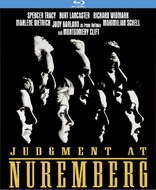Judgment at Nuremberg Blu-ray Movie
HomeJudgment at Nuremberg Blu-ray Movie 
Kino Lorber | 1961 | 186 min | Not rated | Jan 09, 2018Movie rating
8.1 | / 10 |
Blu-ray rating
| Users | 5.0 | |
| Reviewer | 3.5 | |
| Overall | 3.5 |
Overview
Judgment at Nuremberg (1961)
In 1948, an American court in occupied Germany tries four Nazi judges for war crimes and crimes against humanity.
Starring: Spencer Tracy, Burt Lancaster, Richard Widmark, Marlene Dietrich, Maximilian SchellDirector: Stanley Kramer
| History | Uncertain |
| Drama | Uncertain |
Specifications
Video
Video codec: MPEG-4 AVC
Video resolution: 1080p
Aspect ratio: 1.66:1
Original aspect ratio: 1.85:1
Audio
English: DTS-HD Master Audio 2.0 Mono (48kHz, 16-bit)
Subtitles
English SDH
Discs
Blu-ray Disc
Single disc (1 BD)
Playback
Region A (locked)
Review
Rating summary
| Movie | 4.0 | |
| Video | 3.5 | |
| Audio | 4.0 | |
| Extras | 2.5 | |
| Overall | 3.5 |
Judgment at Nuremberg Blu-ray Movie Review
Reviewed by Dr. Stephen Larson December 13, 2022The 2018 Blu-ray release of Stanley Kramer's JUDGMENT AT NUREMBERG (1961) courtesy of Kino Lorber Studio Classics remains in print. It has effectively replaced Twilight Time's BD-50, which went out of print years ago. Kino's edition brings over the same extras that were included on MGM's 2004 "Special Edition" DVD and three Blu-rays of the film. In English, with optional English SDH for feature only. Region "A" locked.
For a detailed synopsis and interpretive analysis of the film, see Jeff Kauffman's review of the TT disc here. Judgment at Nuremberg had its global premiere in Germany at the Kongresshalle, West Berlin's civic auditorium, on December 14, 1961. Win Fanning, the Pittsburgh Post-Gazette film critic at the time, attended along with what he described as an invited international audience of more than 2,000. According to Fanning, the attendees greeted the picture with applause through much of its screening. Other moments were met with "stunned silence" by many Germans who lived during the Third Reich. West Berlin Mayor Willy Brandt delivered a brief introductory speech which accentuated "the importance of international justice in relation to the current Berlin situation." Fanning observed several high officials from the East German Government and a number of Communist newspapermen who listened to Brandt's comments sans any expression.
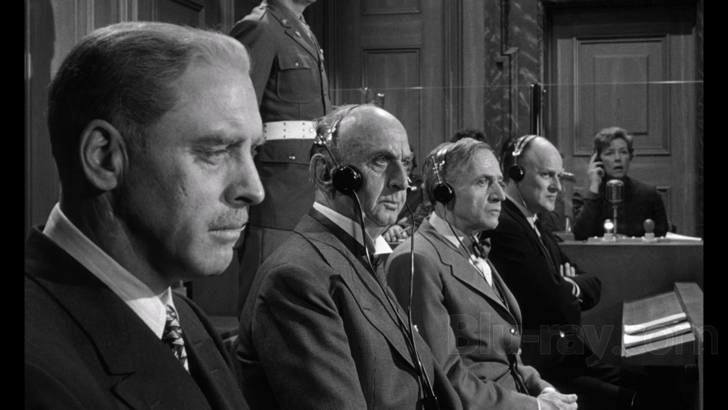
The four defendants.
This sixth feature directed by Kramer had its American premiere five days later in New York where it was apparently well-received. The Daily (NY) News named Judgment at Nuremberg one of the paper's ten best films of 1962. (It qualified for the paper's selection the following year likely because United Artists gave it a wider domestic release.) Critical reception was almost unanimously superlative across North America. The San Francisco Examiner's Stanley Eichelbaum deemed it "one of the boldest, most significant, honest and incisive films of the last decade; that, despite its length, it is always exciting and uniquely absorbing; and that its dramatic impact hit me with the power of a bulldozer." Jay Carmody, drama critic for The Evening Star (Washington, DC), gave it massive praise: "Here is one of the screen’s major all-time triumphs, momentous in theme and absorbing in its grip upon the emotions of the moviegoer. Thanks to perfectly meshed writing, direction, and acting, it visualizes men and women, not saints and devils, sifting the rubble of 2,000 years of human progress for the shattering why of its sudden reversal." The Montreal Star's Sydney Johnson described it as "one of the most thoughtful films of all time." One of the movie's few (vehement) dissenters was Lithuanian-born avant-garde filmmaker Jonas Mekas, who must have been one of the first to see Judgment at Nuremberg. In his review published in the 11/9/61 issue of The Village Voice, Mekas argued that the picture is "as pretentious, as false in its messages, as styleless, and pompous as any of Kramer’s previous films." Although Mekas sat through Judgment at Nuremberg without walking out, he was flabbergasted no one did. He accused Kramer of erecting fascist-like images as part of the film's mise-en-scène. He compared its compositions to Mussolini's statues, Stalin’s portraits, and Goebbels’s architecture. Mekas thought that all of Kramer's characters were interchangeable because they were allegedly so homogeneous. Mekas's pre-release criticism didn't dent the film at all. It went on to win two Oscars, two Golden Globes, and numerous other rewards.
Judgment at Nuremberg Blu-ray Movie, Video Quality 

Kino's release of Judgment at Nuremberg comes on this MPEG-4 AVC-encoded BD-50 (disc size: 43.02 GB). The film appears in its presumed native ratio of 1.66:1, which is the same framing as other DVDs and Blu-rays. This appears to be the same HD master from MGM that's also the source for the Twilight Time and BFI transfers. The image looks mostly crisp but is sometimes on the softer side for the brighter lit scenes. There's occasional and minor print artifacts that appear throughout the picture. See Screenshot #s 17-20. There's newsreel footage excerpted from the Buchenwald concentration camp and Nuremberg's postwar ruins. Kino has encoded the 179-minute movie at a mean video bitrate of 25974 kbps. (The back cover incorrectly lists 186 minutes as the runtime.) By comparison, the average bitrate for the Twilight Time is 18000 kbps. My video score for the Kino is 3.75/5.00.
The Twilight Time includes the special Roadshow Version (190 minutes) comprising an Overture, Intermission, Entr'acte, and Exit Music. The Kino only has the general release version. My research suggests that both were seen by critics in 1961-62 with a longer Roadshow spanning 200 minutes. The Fort Worth Star-Telegram's Amusements Editor Elston Brooks reflected on what he saw in Berlin: "The formally attired audience of 1,400 gave enthusiastic fadeout applause when the lights came up at the vast Kongress Halle here after three hours and 10 minutes (plus intermission) of the year's most absorbing drama." Dale Stevens, film critic for The Cincinnati Post and Times Star, also attended the world premiere but the version he saw in Ohio "has been imperceptibly shortened from the one I saw in Berlin." Kate Cameron of the Daily (NY) News gave her readers a preview of what they'd be seeing: "The picture will be presented on a road-show basis. That is, there will be 10 performances a week, one every night, with matinees on Wednesdays, Saturdays, and Sundays. Of course an extra matinee will be given on a holiday. The film runs for 3 hours and 20 minutes, including a 15-minute intermission." Hope Pantell of Baltimore-based The Evening Sun: "It runs all of three hours and 20 minutes." The San Francisco Examiner's Stanley Eichelbaum rounded up, stating he saw a "three-and-a-half hour film." Could it be that the Roadshow Version which played in cinemas in the early '60s contained a longer intermission or was there ten minutes of additional footage that has since been lost?
Kino's standard eight chapters accompany the long feature.
Judgment at Nuremberg Blu-ray Movie, Audio Quality 
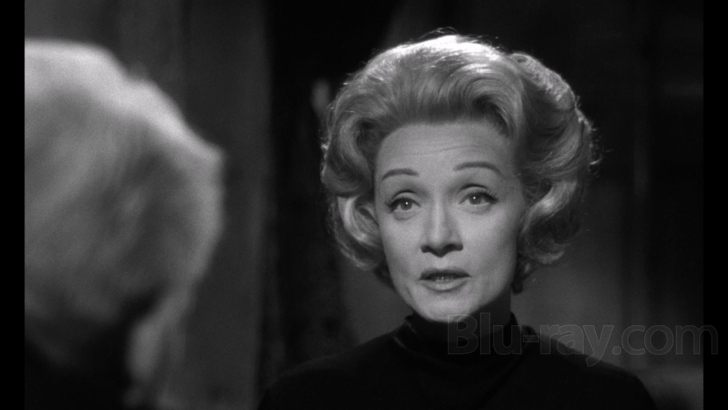
Kino has supplied a DTS-HD Master Audio Dual Mono (1558 kbps, 16-bit). The TT has both a DTS-HD Master Audio 1.0 (1043 kbps, 24-bit) and a DTS-HD Master Audio 5.1 Remix (3729 kbps, 24-bit). The BFI likewise has a DTS-HD Master Audio 5.1 Surround (3654 kbps, 24-bit) and an LPCM 2.0 Stereo (2304 kbps, 24-bit). Kino monaural track is free from audible hiss, cracks, pops, or dropouts. This is a courtroom drama that relies heavily on spoken words, which are focalized on the center speaker. Composer Ernest Gold wrote a small score that consists of a German march, a light waltz, and some dramatic underscore. Burt Lancaster, who portrays defendant Ernst Janning, the 60-year-old former Nazi minister of justice, told the Oakland (CA) Tribune's drama critic Theresa Loeb Cone that he didn't adapt a genuine German accent in the film, but delivered his dialogue in such as way to make viewers think "they are hearing an authentic German voice." Lancaster said he worked hours and hours of with a tape recorder so he could get master intonation and rhythm of delivery. That comes across effectively on the lossless sound track.
Optional English SDH are available to select on the menu or switch on during the feature.
Judgment at Nuremberg Blu-ray Movie, Special Features and Extras 
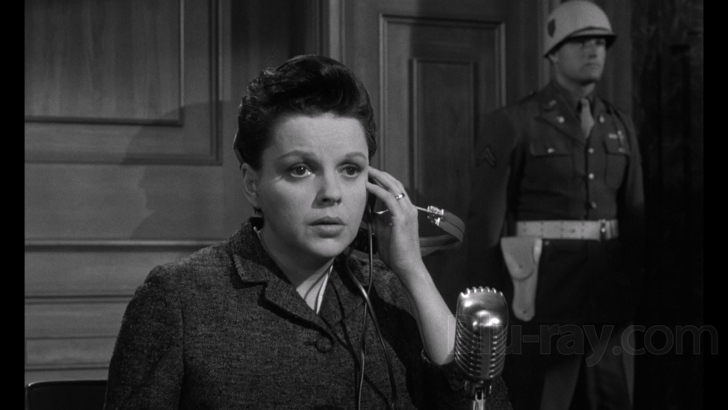
Kino rehashes the same set of bonus materials as other DVD/BD versions except a photo gallery totaling 127 stills on the 2004 MGM DVD. The gallery is divided into five sections: "Costume Design," Set Design," "On Location," "Stanley Kramer at Work," and "Premiere in Berlin." In late January 2020, the BFI included three of this disc's featurettes on a separate DVD (which also contains five short films) to go along with a Blu-ray that contains the 179-minute version of the film, an audio commentary with film historian Jim Hemphill, an audio-only 1971 interview with Maximilan Schell, an image gallery, the trailer, and a 32-page booklet (first pressings only).
- In Conversation with Abby Mann and Maximilan Schell (19:39, 480i) - this is a ca. 2004 dialogue between Mann and Schell about their contributions to Judgment at Nuremberg. Mann lauds Schell for his performance as Hans Rolfe while the Viennese actor credits the writer for giving him great material. Both discuss the Playhouse 90 episode of Judgment at Nuremberg (1959), which Mann also wrote and Schell played Otto Rolfe. Schell reminisces about director George Roy Hill, starring opposite Marlon Brando in The Young Lions (1958), and working with Tracy on Judgment at Nuremberg. This is a lively chat well worth watching. In English, not subtitled.
- The Value of a Single Human Being (6:03, 480i) - a short featurette in which Abby Mann distills the meaning of the Nuremberg trials and the actions of the perpetrators. He draws comparisons between the McCarthy-led investigations of the 1950s and global events that were happening in the mid-2000s. His remarks are intercut with color photographs from Judgment at Nuremberg's production.
- A Tribute to Stanley Kramer (14:28, 480i) - Kramer's widow Karen Sharpe Kramer and Abby Mann pay tribute the legendary producer/director's legacy. Mrs. Kramer speaks about appearing in The Sniper (1952), which her future husband produced. She recalls seeing Stanley again when he appeared on a sound stage during the production of Ship of Fools (1965) opposite the one she was working on. Mann and her also discuss Playhouse 90. In English, not subtitled.
- Theatrical Trailer (3:02) - this unrestored trailer for Judgment at Nuremberg is presented in cropped widescreen. It's rife with film artifacts and blemishes.
- Bonus Trailers - KLSC trailers for Inherit the Wind, On the Beach, Not as a Stranger, and A Child Is Waiting.
Judgment at Nuremberg Blu-ray Movie, Overall Score and Recommendation 
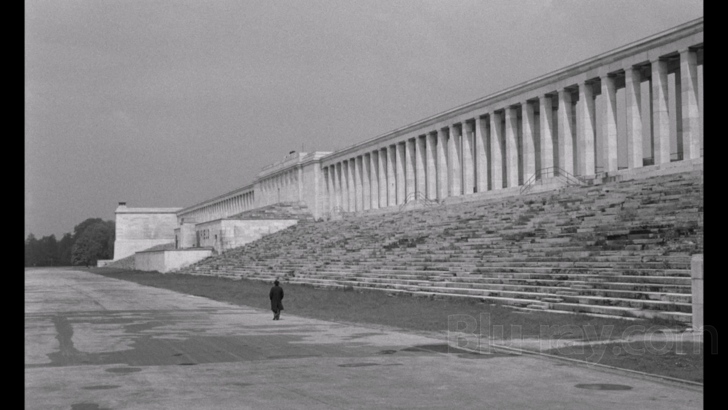
Kino Lorber's BD-50 of Judgment at Nuremberg offers a much cheaper alternative to those who didn't pick up the Twilight Time after the 3,000 units sold out. While it doesn't offer the Roadshow Version, the Kino boasts a superior encode. I believe the current master should receive a fuller restoration, though. If you reside in Region "A" territories, then this is a good edition to pick up. If you're in Region "B" parts or have a code-free player, then the BFI BD/DVD combo is worth purchasing for the volume of supplementary material. A SOLID RECOMMENDATION for this "standard" Kino disc.
Other editions
Judgment at Nuremberg: Other Editions
Similar titles
Similar titles you might also like

Labyrinth of Lies
Im Labyrinth des Schweigens
2014

Bridge of Spies
2015

The Court-Martial of Billy Mitchell
One Man Mutiny | Special Edition
1955

Never Look Away
Werk ohne Autor
2018

The Mortal Storm
Warner Archive Collection
1940

Breaker Morant
1980

Emperor
2012

Inherit the Wind
1960

The Ipcress File
1965

Che!
Limited Edition to 3000
1969

Funeral in Berlin
1966

Missing
1982

The Good Shepherd
2006

Johnny Belinda
1948

Woman in Gold
2015

Footsteps in the Fog
1955

The Good German 4K
2006

Boomerang
1947

All My Sons
1948

The Atomic City
1952
